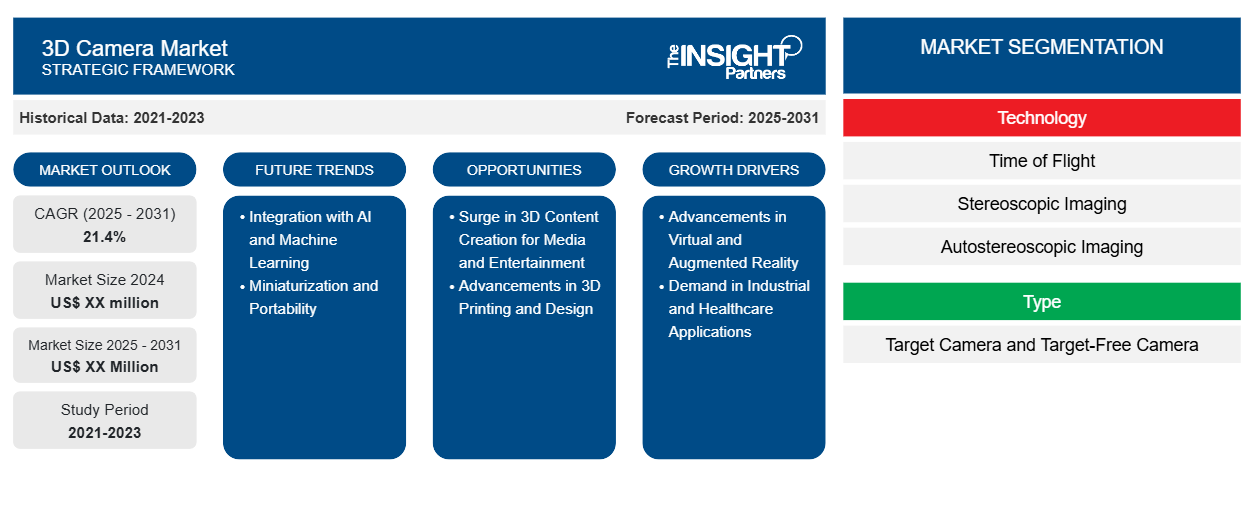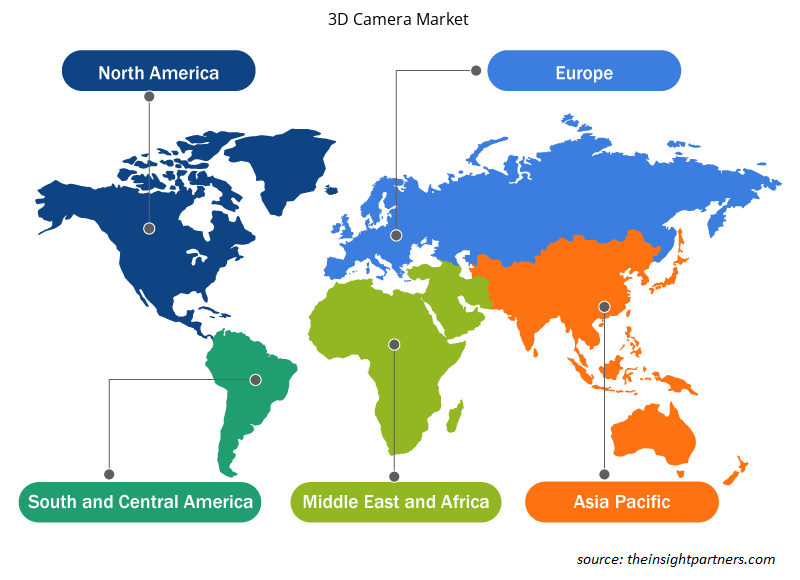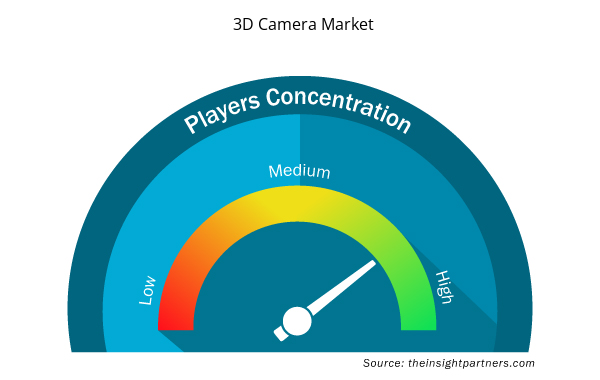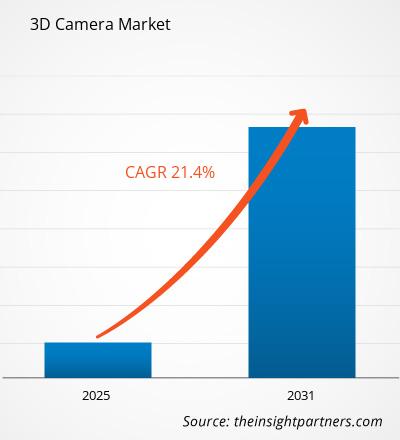The 3D camera Market is expected to register a CAGR of 21.4% from 2025 to 2031, with a market size expanding from US$ XX million in 2024 to US$ XX Million by 2031.
The report is segmented by Technology (Time of Flight, Stereoscopic Imaging, Autostereoscopic Imaging, Structured Light Imaging), Type (Target Camera and Target-Free Camera), End-user (Consumer Electronics, Healthcare, Industrial, Aerospace and Defense, Construction, Automotive, Media & Entertainment). The global analysis is further broken-down at regional level and major countries. The report offers the value in USD for the above analysis and segments
Purpose of the Report
The report 3D camera Market by The Insight Partners aims to describe the present landscape and future growth, top driving factors, challenges, and opportunities. This will provide insights to various business stakeholders, such as:
- Technology Providers/Manufacturers: To understand the evolving market dynamics and know the potential growth opportunities, enabling them to make informed strategic decisions.
- Investors: To conduct a comprehensive trend analysis regarding the market growth rate, market financial projections, and opportunities that exist across the value chain.
- Regulatory bodies: To regulate policies and police activities in the market with the aim of minimizing abuse, preserving investor trust and confidence, and upholding the integrity and stability of the market.
3D camera Market Segmentation
Technology
- Time of Flight
- Stereoscopic Imaging
- Autostereoscopic Imaging
- Structured Light Imaging
Type
- Target Camera and Target-Free Camera
End-user
- Consumer Electronics
- Healthcare
- Industrial
- Aerospace and Defense
- Construction
- Automotive
- Media & Entertainment
Geography
- North America
- Europe
- Asia-Pacific
- South and Central America
- Middle East and Africa
Customize This Report To Suit Your Requirement
You will get customization on any report - free of charge - including parts of this report, or country-level analysis, Excel Data pack, as well as avail great offers and discounts for start-ups & universities
3D Camera Market: Strategic Insights

- Get Top Key Market Trends of this report.This FREE sample will include data analysis, ranging from market trends to estimates and forecasts.
3D camera Market Growth Drivers
- Advancements in Virtual and Augmented Reality: The growing demand for immersive technologies like virtual reality (VR) and augmented reality (AR) is a significant driver for the 3D camera market. 3D cameras are crucial for creating realistic 3D content, which enhances the overall user experience in VR and AR applications. Industries such as gaming, entertainment, and education are increasingly adopting 3D cameras to create interactive, lifelike environments, pushing the need for high-quality imaging technologies that support these experiences.
- Demand in Industrial and Healthcare Applications: 3D cameras are becoming increasingly essential in industrial and healthcare sectors for applications like quality control, inspection, and medical imaging. The ability to capture precise 3D images aids in improving accuracy and efficiency in tasks such as reverse engineering, scanning, and diagnosing. The growing adoption of 3D scanning in these industries is driving demand for more advanced 3D camera solutions.
3D camera Market Future Trends
- Integration with AI and Machine Learning: A key trend in the 3D camera market is the integration of artificial intelligence (AI) and machine learning. These technologies help enhance image processing, depth sensing, and object recognition, enabling faster and more accurate 3D modeling and scanning. AI-powered 3D cameras are increasingly used in applications such as facial recognition, gesture control, and autonomous vehicles, improving both functionality and precision.
- Miniaturization and Portability: Miniaturization of 3D camera technologies is another growing trend. As consumer electronics such as smartphones, drones, and wearables adopt 3D cameras, there is a shift towards more compact, lightweight, and portable models. These smaller, user-friendly devices are designed to deliver high-quality 3D imaging while offering ease of use, making them increasingly popular among both professionals and consumers.
3D camera Market Opportunities
- Surge in 3D Content Creation for Media and Entertainment: The demand for 3D content in the media and entertainment industries is increasing, driven by the popularity of 3D movies, gaming, and live-streaming. 3D cameras enable filmmakers and content creators to produce high-quality, immersive visuals, opening up new business avenues in film production, gaming, and virtual events. The rise of 3D content creation for platforms like YouTube and gaming consoles provides an expanding market for 3D cameras.
- Advancements in 3D Printing and Design: 3D cameras are essential tools for 3D printing, especially in design, prototyping, and manufacturing. They enable precise scanning and digitization of physical objects for 3D modeling and reproduction. The increasing use of 3D printing across various industries, including automotive, aerospace, and healthcare, presents significant growth opportunities for the 3D camera market, particularly in applications like custom manufacturing and product development.
3D Camera Market Regional Insights
The regional trends and factors influencing the 3D Camera Market throughout the forecast period have been thoroughly explained by the analysts at Insight Partners. This section also discusses 3D Camera Market segments and geography across North America, Europe, Asia Pacific, Middle East and Africa, and South and Central America.

- Get the Regional Specific Data for 3D Camera Market
3D Camera Market Report Scope
| Report Attribute | Details |
|---|---|
| Market size in 2024 | US$ XX million |
| Market Size by 2031 | US$ XX Million |
| Global CAGR (2025 - 2031) | 21.4% |
| Historical Data | 2021-2023 |
| Forecast period | 2025-2031 |
| Segments Covered |
By Technology
|
| Regions and Countries Covered | North America
|
| Market leaders and key company profiles |
3D Camera Market Players Density: Understanding Its Impact on Business Dynamics
The 3D Camera Market market is growing rapidly, driven by increasing end-user demand due to factors such as evolving consumer preferences, technological advancements, and greater awareness of the product's benefits. As demand rises, businesses are expanding their offerings, innovating to meet consumer needs, and capitalizing on emerging trends, which further fuels market growth.
Market players density refers to the distribution of firms or companies operating within a particular market or industry. It indicates how many competitors (market players) are present in a given market space relative to its size or total market value.
Major Companies operating in the 3D Camera Market are:
- Canon Inc
- Eastman Kodak Company
- SICK AG
- Fujifllm Holdings Corporation
- GoPro, Inc.
- LG Electronics Inc
Disclaimer: The companies listed above are not ranked in any particular order.

- Get the 3D Camera Market top key players overview
Key Selling Points
- Comprehensive Coverage: The report comprehensively covers the analysis of products, services, types, and end users of the 3D camera Market, providing a holistic landscape.
- Expert Analysis: The report is compiled based on the in-depth understanding of industry experts and analysts.
- Up-to-date Information: The report assures business relevance due to its coverage of recent information and data trends.
- Customization Options: This report can be customized to cater to specific client requirements and suit the business strategies aptly.
The research report on the 3D camera Market can, therefore, help spearhead the trail of decoding and understanding the industry scenario and growth prospects. Although there can be a few valid concerns, the overall benefits of this report tend to outweigh the disadvantages.
- Historical Analysis (2 Years), Base Year, Forecast (7 Years) with CAGR
- PEST and SWOT Analysis
- Market Size Value / Volume - Global, Regional, Country
- Industry and Competitive Landscape
- Excel Dataset


- Emergency Department Information System (EDIS) Market
- Pipe Relining Market
- Collagen Peptides Market
- Influenza Vaccines Market
- Portable Power Station Market
- Occupational Health Market
- Resistance Bands Market
- Drain Cleaning Equipment Market
- Cell Line Development Market
- Water Pipeline Leak Detection System Market

Report Coverage
Revenue forecast, Company Analysis, Industry landscape, Growth factors, and Trends

Segment Covered
This text is related
to segments covered.

Regional Scope
North America, Europe, Asia Pacific, Middle East & Africa, South & Central America

Country Scope
This text is related
to country scope.
Frequently Asked Questions
Some of the customization options available based on the request are an additional 3-5 company profiles and country-specific analysis of 3-5 countries of your choice. Customizations are to be requested/discussed before making final order confirmation# as our team would review the same and check the feasibility
The report can be delivered in PDF/PPT format; we can also share excel dataset based on the request
Demand from growing region and use in industrial robots are the major factors driving the 3D camera market.
Growing AR, VR and 3D Printing Technology are likely to remain a key trend in the market.
The 3D camera market is estimated to witness a CAGR of 21.4% from 2023 to 2031
Trends and growth analysis reports related to Electronics and Semiconductor : READ MORE..
The List of Companies
1. Canon Inc.
2. Eastman Kodak Company
3. FARO Technologies, Inc.
4. Fujifilm Holdings Corporation
5. GoPro, Inc.
6. LG Electronics Inc.
7. Nikon Corporation
8. Panasonic Corporation
9. Samsung Electronics Co., Ltd.
10. Sony Corporation

 Get Free Sample For
Get Free Sample For